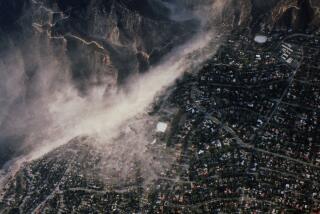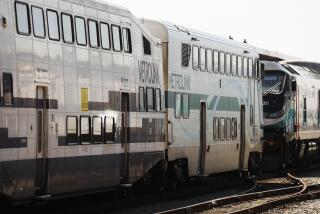Life and Limbs
- Share via
The tremor along the Newport-Inglewood fault early this month was barely a ripple in the consciousness of most Southern Californians--but it was enough to shake Ulises Pena out of slumber and bury him in fear. He lay there limp with dread, waiting for the Earth to swallow him whole and the heavens to rain concrete.
Three years after his legs were crushed under 20 tons of cement, leaving him trapped in such agony that he tried to strangle himself to end it, Pena is still in constant pain.
Six operations and extensive physical therapy have enabled him to bend his knees and shuffle about his South-Central apartment on a crutch. His ruined legs, supported by steel braces, barely hold him.
And after years of counseling for post-traumatic stress, claustrophobia plagues his sleep.
“In my dreams things are always falling on top of me,” he said. “The first thing I try to do is sit up, but I can’t move--I just shake and wait for the worst to come.”
Pena, 46, a Salvadoran immigrant, was operating a power sweeper in a three-story parking garage at Northridge Fashion Center when the 6.7 magnitude earthquake toppled the structure in January 1994, pinning him under the rubble for more than seven hours before he was freed and flown by helicopter to UCLA Medical Center. Three other parking garages at the mall were severely damaged, but remained standing.
Pena filed a $12-million lawsuit against the owners, managers and designers of the Northridge mall two years ago, alleging that the parking garage that fell on him was unsafe. “This parking structure was not designed according to the requirements of local building codes,” said Pena’s attorney, Jeffrey Knoll. “Our position is that the design allowed for too much movement during the quake.”
But Bob Young, an attorney for Robert Englekirk, the structural engineer who approved the building, said the garage collapsed because the Northridge earthquake was unusually powerful.
“The building codes didn’t anticipate the lateral force of the quake, which exceeded code expectations by five times,” he said.
Chan Chandler, a spokeswoman for MEPC American Holdings Inc., the Dallas company that owns the mall, said the corporation’s executives were very sorry about Pena’s injuries. But MEPC acquired the property only two months before the temblor, she said.
“It was an act of God,” she said.
The parties are presently in mediation, hoping to avoid a trial scheduled to begin Sept. 22.
“I actually tried to take my life away,” said Pena, recalling the day of the earthquake. “But I only had one hand--the other was pinned.”
At first the pain was so bad he thought he would die. Then he wished he would die. Then he tried to make himself die. Agony drove Pena to attempt to strangle himself with his free hand.
Sometime during those pain-drenched hours, Pena’s legs began to fade.
“I felt them weakening--they were tingling,” he said.
When he was finally rescued by firefighters and airlifted to the UCLA Medical Center helipad, he was barely conscious. The last thing Pena did before sinking into a three-day sleep was sign his legs away. Strapped to a stretcher, windblown by helicopter blades, Pena signed a release authorizing doctors to amputate if necessary.
“I didn’t care,” he said. “I wanted them to do whatever they had to do to get rid of the pain.”
Fortunately, amputation was not necessary. Pena pulls his pants up over his knees, revealing legs gnarled as half-used candles. Pointing to several skin-graft scars, he praised the surgeons who repaired the muscle and bone that was compressed under tons of rubble. Pena said he has had no trouble paying his medical bills, since he is covered by workers’ compensation.
He has gained strength in his lower body, he said, but his progress has plateaued in recent months. He can move about, but only with great difficulty, and he rarely leaves the modest apartment he shares with his girlfriend. For fear of addiction, his doctor stopped prescribing painkillers. A daily bath is now Pena’s sole respite.
Winter is the cruelest season, when rain and cold conspire to torture his bones. But his physical pain pales in comparison to his constant fear and melancholy.
“I actually will be able to recover more from my physical injuries than my mental,” he said. “Sometimes I feel like these are not my legs.”
More to Read
Sign up for Essential California
The most important California stories and recommendations in your inbox every morning.
You may occasionally receive promotional content from the Los Angeles Times.










